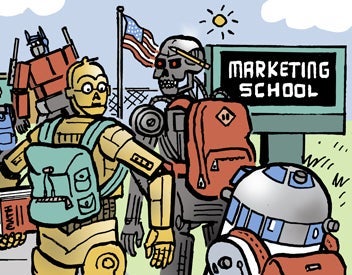Sharing to Put 5,000 in the ‘Hurt Locker’
Voltage Pictures, the independent production company that produced “The Hurt Locker,” filed complaints against 5,000 people who illegally shared the film. Here’s a picture tour of what these documents (from Verizon and the U.S. Copyright Group) will look like. (CNET)
Responding to Reviews Online
Here’s a list of tips for how to engage negative brand reviews on the Internet. Embrace the negative reviews, says this analyst. She also suggests structuring your responses and to take some time to be thankful for the good reviews. (Econsultancy)
IE6 Dips Below 5%
For the first time ever, Internet Explorer 6 saw its market share fall below the 5 percent mark in May in the U.S. and Europe, according to StatCounter. Just a year ago, IE6’s market share stood at 11.5 percent. (StatCounter)
House of Representatives Committee Eyes Facebook, Google
A House of Representatives committee is looking into privacy concerns for both Facebook and Google. A brief letter addressed to Mr. Mark Zuckerberg asks for a “detailed explanation of the information about Facebook users that your company has provided to third parties without the knowledge of the account holders – particularly in circumstances in which the users did not expressly opt for this type of information sharing.” Another letter to Google touches on data collection via Street View. (CNET)
Facebook is the Most Important for Social Media Marketing
Not surprisingly, Facebook was cited as the most important site for social media marketers, according to Omniture. Sixty-nine percent of 600 respondents said they are using social media in their marketing campaigns. Of this group, 63 percent said Facebook is the most important site for those efforts, followed by blogs with 40 percent, other sites with 34 percent and Twitter with 28 percent. (ClickZ)
Top Facebook Games Shrink in Popularity
More than half of the 25 biggest games on Facebook continued to shed users in May. It’s possible that this is just a matter of games getting old, but it probably highlights the troubles that came with Facebook’s decision to remove app notifications at the start of March. Developers now have to focus more on organic growth, advertising and cross-promotion. (Inside Social Games)
Are Hyperlinks Bad?
Nicholas Carr wonders if Steve Gillmor was onto something in his crusade against hyperlinks. While links are “wonderful conveniences…they’re also distractions.” While footnotes give your brain a “gentle nudge,” links give it a “yank.” This isn’t to say that links should be done away with altogether, but how about saving them for the end of posts? (Rough Type)
Beta Testers Wanted for Facebook Q&A
Facebook is looking for beta testers for it question-and-answer product. The application asks applicants to submit three questions and answers. (WebProNews)
PPC Optimization
For those who can withstand some heavy math, here’s a post with a rundown of how to optimize your PPC campaign to profit from every click. (Search Engine Guide)
Did Google Screw the Long Tail?
Google’s newly tweaked algorithm seems to be giving higher-quality sites priority in long-tail queries. (Search Engine Land)
Lawyers for Startups
Yes, startups need lawyers. It’s a good idea to get quotes/estimates, and to talk frankly with them about your needs. It’s also key to know when to ask for their advice and when to ignore it. (ReadWriteWeb)
Android Productivity Apps
For Android users, here’s a list of 10 apps that will boost your productivity. Among them are Dropbox, GDocs and Springpad. (Mashable)
7 Deadly Sins of Google Local Listings
Stuffing business titles with keywords, using a P.O. box as your business address and hiding your address are some of the seven deadly sins of Google local listings. In the end, it’s always best to play it safe. (Search Engine Journal)
‘Tabnapping’ is the Latest Phishing Tactic
“Tabnapping” or “tabjacking” leads users to what appears to be a genuine site that delivers the promised content. “Then, if the user leaves the page open in a browser tab and clicks to another tab, the malicious tab changes itself into a replica of the trusted site. It changes the title and the icon displayed on the tab, among other things,” according to Mozilla Firefox’s creative lead. (ZDNet UK)
BP Oil Spill and Affiliate Marketing Fraud
While it’s just a metaphor, the BP oil spill serves as a good reminder that “Merchants need good publishers. Publishers need good offers. Networks need both. But we also need each other to behave. We all need to stick to the rules of the ecosystem.” (mThink.com)
BlockChalk Gets VC Funding
The anonymous location-based social networking service has notched venture support. The anonymous nature of the service allows for abuse, so it’ll be interesting to see how BlockChalk will shift gears, if at all. (ReadWriteWeb)
Facebook Pages Will Get New Tab Dimensions
Dimensions on custom tabs on Facebook Pages will be narrower in about two months. This is important news for agencies and Page managers, lest they look like amateurs. (Inside Facebook)
Spending on Virtual Goods up 14%
According to Frank N. Magid Associates and PlaySpan, average spending on virtual good is up to $99 from $87 last year, an increase of 14 percent. However, only 13 percent of the U.S. population is buying virtual goods, up only slightly from 12 percent last year. (MediaPost)
Africa Sends 3.6 Billion Spam E-Mails Per Day
For all the good broadband does, one thing it also helps is the sending of spam, according to Symantec. Africa, which has benefited from faster broadband connections, is now sending 3.6 billion spam e-mails each day, or 3 percent of the global total. This is up 50 percent from last year. (VentureBeat)
Yahoo! Partners with Zynga
Zynga will roll out its popular social games across Yahoo!’s sites. This comes on the heels of some rocky times with Facebook, though Zynga recently agreed to a five-year deal with the social networking giant. (Inside Social Games)
SEO Basics for Videos
Here’s a rundown of the SEO basics for online videos, broken into tactics for Flash and HTML5. (The Fire Horse Trail)
Facebook’s New Privacy Options
Facebook unveiled its new set of simpler privacy options for its users. But it was too late for 71 percent of respondents to a Pew Research report. This group already adjusted their default privacy settings. (Business Insider, ReadWriteWeb)
Online Display Ad Spending Up 5%
Spending on online display ads rose 5 percent in the first quarter of 2010, compared to the same period last year, according to Kantar Media. Overall, across all media sectors, ad spending rose 5.1 percent. The magazine media, newspaper media and outdoor sectors were the only ones to see a drop in spending. (AdAge.com)
 Network
Network

